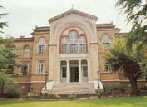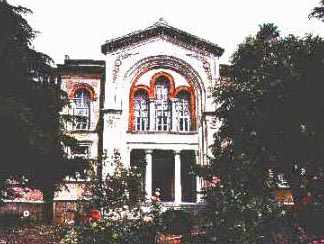Legislation in the form of HB Res. 345 was introduced in the House of Representatives by U.S. Representative Michael Bilirakis (R9-FL.) Supreme President Andrew T. Banis of the American Hellenic Educational Progressive Association (AHEPA), the largest and oldest association of Americans of Greek descent and Philhellenes, said he has "been working diligently for over a year to create a bill that would garner bipartisan support in Congress."
The seminary was shut down in 1971. As the legislation describes, the school's closure is in violation of international treaties, to which Turkey has been a signatory.
HB Res. 345, submitted for concurrent resolution to the committee of the 107th Congress 2D Session by the Honorable Michael Bilirakis, reads as follows:
107th Congress, 2D Session
H. CON. RES.
IN THE HOUSE OF REPRESENTATIVES
Mr. Bilirakis submitted the following concurrent resolution; which was referred to the Committee:
CONCURRENT RESOLUTION
Expressing the sense of the Congress that the Orthodox Theological School of Halki in the Republic of Turkey be reopened in order to promote religious freedom.
Whereas the Theological School of Halki, located on the island of Halki in the Republic of Turkey, was preceded by the Monastery of the Trinity which was founded by Patriarch Photius I and characterized as a "stadium of wisdom" for its large library and the men who studied there;
Whereas the monastery was rebuilt into an Orthodox School of Theology by Patriarch Germanos IV and rededicated on September 23, 1844, nurturing men of merit, educators, and scholars for 127 years;
Whereas the Theological School of Halki, which in its official title is called "Seminary," was closed in 1971 by Turkish authorities under a law requiring that higher education in religion and military training be controlled by the state;
Whereas Turkish law requires that the Patriarch, as well as all the clergy, faculty, and students of the Theological School of Halki be citizens of Turkey;
Whereas the Theological School of Halki is the only educational institution for Orthodox Christian leadership in Turkey;
Whereas the Theological School of Halki also contains of [sic] one of the richest libraries in the world in rare and precious works, while there are approximately 14 employees and 4 clerics who currently maintain the School;
Whereas the closing of the Theological School of Halki is a serious concern for the Ecumenical Patriarchate and all Orthodox Christians worldwide;
Whereas the Ecumenical Patriarchate is the spiritual center for more than 300,000,000 Orthodox Christians worldwide, including approximately 5,000,000 Orthodox Christians in the United States;
Whereas since its closure, the Ecumenical Patriarchate has been deprived of all the adequate means to educate its clergy (from among whom the next Ecumenical Patriarch will have to be selected), a right enjoyed by Turkish citizens of the Muslim faith;
Whereas as a result of the closing of the Theological School of Halki, the Patriarchate has been compelled to train its religious personnel abroad;
Whereas His All Holiness Patriarch Bartholomew I received the Congressional Gold Medal in October 1997 for his efforts to promote freedom and religious tolerance around the world;
Whereas the closing of the Theological School of Halki is in violation of international treaties to which Turkey is a signatory, including the Treaty of Lausanne, the 1968 Protocol, the Helsinki Final Act of 1975, and the Charter of Paris;
Whereas section 2804 of the Foreign Affairs Reform and Restructuring Act of 1998 (Public Law 105-277; 112 Stat. 2681-846) calls upon the United States to use its influence with the Government of Turkey to guarantee the security of the Ecumenical Patriarchate in Istanbul and to reopen the Theological School of Halki;
Whereas in November 1998, the Board of Trustees of the Patriarchal Theological School of Halki was arbitrarily dismissed by the General Authority for Public Institutions, an agency of the Turkish Government;
Whereas freedom of religion is a universally recognized human right and the Department of State's report on international religious freedom in Turkey cites the closure of the Theological School of Halki as a grave infringement of religious freedom in Turkey which furthermore leads to the inability of the Greek Orthodox Church to properly train new clergy for eventual leadership;
Whereas the closure of the Theological School of Halki by the Government of Turkey has severely compromised the mission of the Ecumenical Patriarchate and the future existence of this Orthodox Christian institution in Turkey;
Whereas Turkey was granted European Union candidacy status in December 1999;
Whereas Turkey's candidacy for European Union accession will be subject to the full criteria established by the 1993 Copenhagen Council for all candidate states, including issues concerning human rights and religious freedom; and
Whereas it is in the best interests of the United States to establish peaceful relations with and among the many important nations of the world that have substantial Orthodox Christian populations: Now, therefore, be it
Resolved by the House of Representatives (the Senate concurring), That it is the sense of Congress that ?
(1) the United States should use its influence with the Government of Turkey and as a permanent member of the United Nations Security Council to suggest that the Turkish Government ?
(A) assure that positive steps are taken to reopen the Theological School of Halki;
(B) provide for the proper protection and safety of the Ecumenical Patriarch, Patriarchate personnel, and
visitors from all over the world, including United States citizens; and
(C) establish conditions to ensure that the Patriarchate is free to carry out its religious mission; and
(2) the President should report to Congress on the status and progress of the concerns in paragraph (1) on an annual basis.
|
|
PARTICIPATE IN THE HALKI SURVEY
Hellenic Communication Service also poses the following questions to its visitors regarding the potential reopening of the Orthodox Theological School of Halki in the Republic of Turkey.
|



